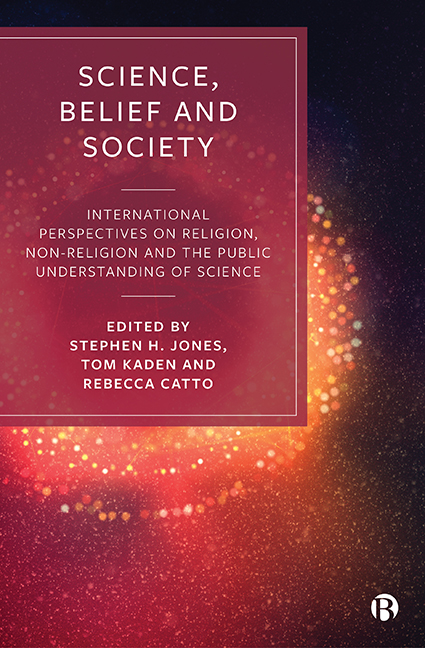 Science, Belief and Society
Science, Belief and Society Book contents
- Frontmatter
- Contents
- List of Figures and Tables
- Notes on Contributors
- Editors’ Acknowledgement
- Foreword
- Editors’ Introduction: Science, Belief and the Sociological Tradition
- PART I Methodological Challenges in the Study of Science and Belief
- PART II Belief in the Study of Science and Technology
- PART III Science, Culture and Non-religion
- PART IV Religion, Conflict and Moderation
- Conclusion: Future Directions in the Sociological Study of Science and Belief
- Index
9 - Avoiding the ‘Anti-intellectual Abyss’: How Secular Humanists in Sweden try to Define the Boundaries between Science, Religion, Pseudoscience and Postmodernism
Published online by Cambridge University Press: 27 April 2022
- Frontmatter
- Contents
- List of Figures and Tables
- Notes on Contributors
- Editors’ Acknowledgement
- Foreword
- Editors’ Introduction: Science, Belief and the Sociological Tradition
- PART I Methodological Challenges in the Study of Science and Belief
- PART II Belief in the Study of Science and Technology
- PART III Science, Culture and Non-religion
- PART IV Religion, Conflict and Moderation
- Conclusion: Future Directions in the Sociological Study of Science and Belief
- Index
Summary
Introduction
In March 2015, the Swedish daily newspaper Dagens Nyheter published an article written by the former chairman of the Swedish Humanist Association (SHA) and other authors warning that the population of Sweden was being led towards an ‘anti-intellectual abyss’ (Ingvar et al, 2015b). This was one of several such statements co-authored by members of the SHA, who have recently stepped up their sciencerelated activism to fight the phenomena they see as taking the country in this dangerous direction. This chapter analyses the SHA's activism and has three key objectives. First, it aims to provide insight into secular humanists’ understanding of science. Second, it identifies the actors and phenomena that are perceived as ‘others’ of, and threats to, science by secular humanists. Finally, and most importantly, fulfilling the first two aims will shed light on the different ways in which secular humanists use references to science in their lobbying and activism, and draw attention to the internal tensions that are associated with these differences.
This study on which this chapter is based is part of a growing research field of non-religion and secularity, which has gained increasing attention especially over the past 10–15 years. More concretely, it relates to research that emphasizes the added value of relational approaches for exploring non-religious phenomena (Campbell, 1971; Quack, 2014; Wohlrab-Sahr and Kaden, 2014). While rooted in this field, the overlaps with science and technology studies will become apparent across the chapter (see Gulker, Chapter 5, this volume), especially studies of ‘boundary work’ to demarcate ‘science’ from ‘nonscience’ (Gieryn, 1999; see also LeDrew, Chapter 10, this volume).
In addition to relational approaches to non-religion, this study has further been inspired by studies that focus on the importance of actors’ constructions of collective identities, including the orientations of their actions in their respective social and cultural contexts (Melucci, 1996; Golova, 2011). Several studies point to the significance of science as one of several – and arguably the most central – reference points for diverse non-religious actors and an important element in their identity construction (Hess, 1993; Smith, 2011; Quack, 2012; Wohlrab-Sahr and Kaden, 2014). A few articles have even addressed SHA members’ understanding of science, highlighting its central components (Lundborg, 2013).
- Type
- Chapter
- Information
- Science, Belief and SocietyInternational Perspectives on Religion, Non-Religion and the Public Understanding of Science, pp. 197 - 222Publisher: Bristol University PressPrint publication year: 2019


